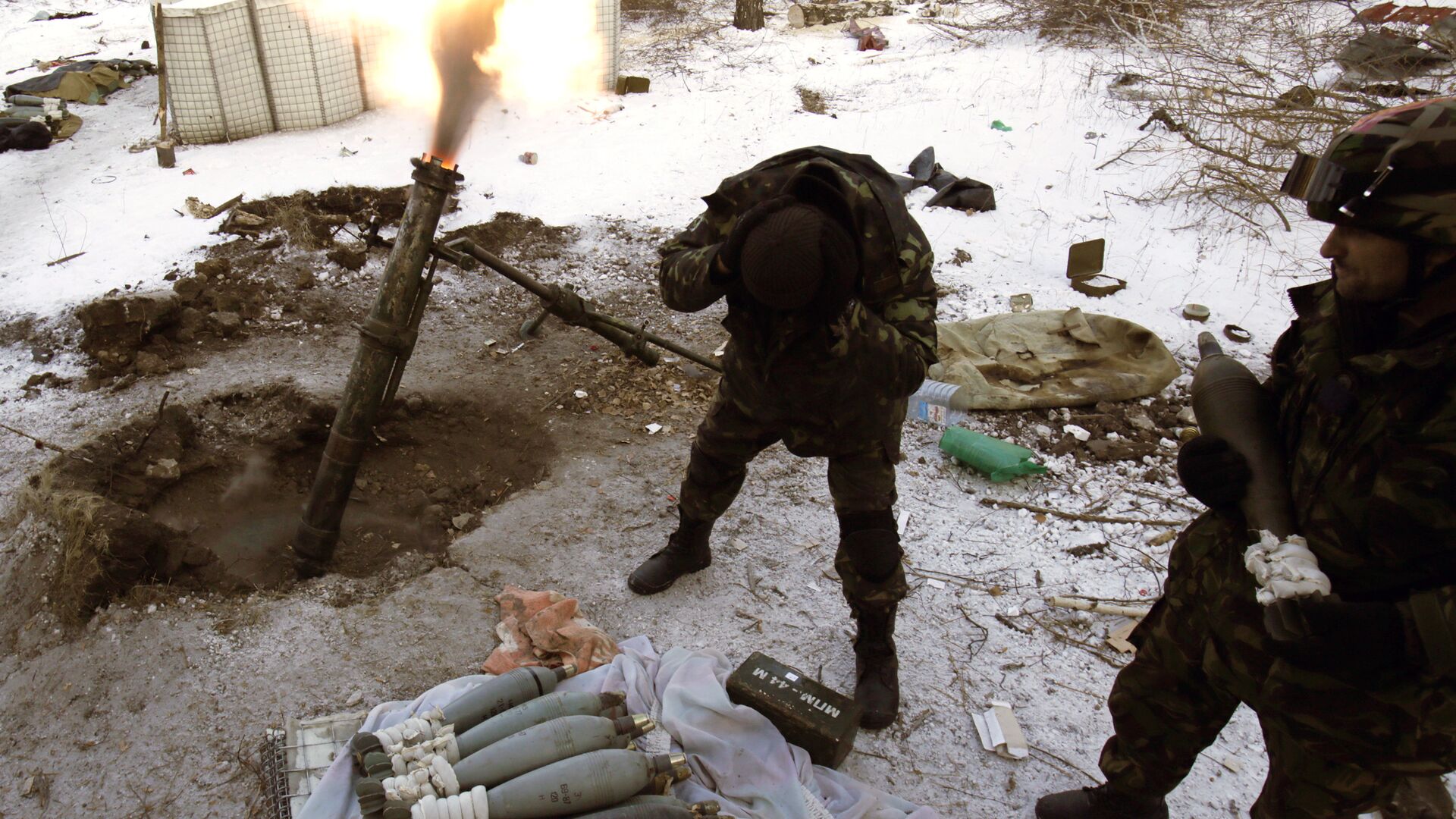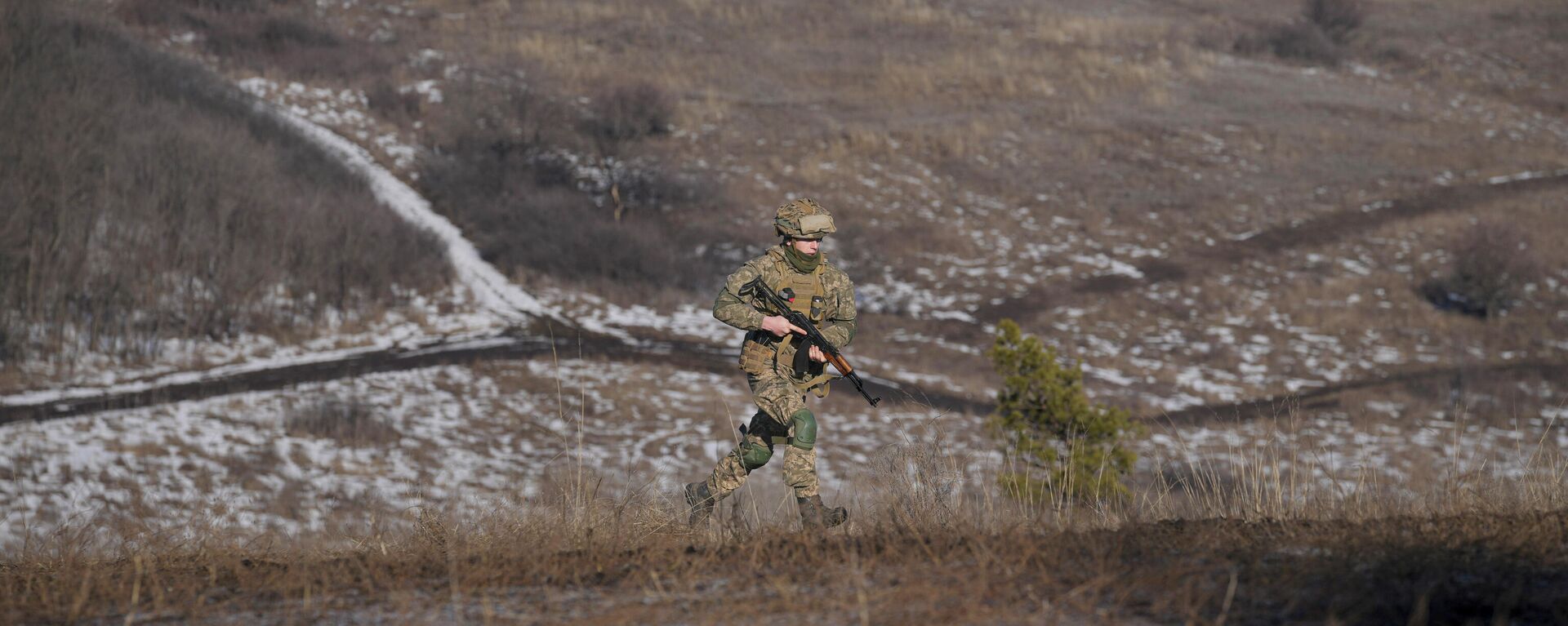DPR Says Kiev Forces Fired 18 Rounds From 120-mm Mortars on Outskirts of Frontline Village
17:30 GMT 18.02.2022 (Updated: 19:25 GMT 18.02.2022)

© AFP 2023 / ANATOLII STEPANOV
Subscribe
Donbass militia leaders ordered an evacuation of civilians from the breakaway Donetsk and Lugansk People's Republics on Friday, citing the threat of Ukrainian shelling and the danger of a full-scale invasion by Kiev. The escalation comes after months of claims by Western officials and media that it was Russia that was preparing to "invade" Ukraine.
Ukrainian forces have fired 18 120-mm mortar rounds at the village of Zaitsevo, a Donetsk People's Republic-controlled settlement situated on the outskirts of the town of Gorlovka, a DPR representative at the Joint Center on Control and Coordination has told journalists.
"At 19:40, shelling was recorded by armed formations of Ukraine in the direction of the village of Zaitsevo. 18 mines were fired," the representative said.
The deployment of 120-mm mortar systems in the Donbass conflict zone is prohibited under the Minsk Agreements - the peace deal hammered out in early 2015 aimed at enforcing a ceasefire in eastern Ukraine and ultimately bringing the civil conflict to a close.
The mortar fire comes amid a major escalation of mortar, artillery and small-arms fire along the line of contact between Kiev forces and Donbass militia in the past two days, with both sides reporting dozens of violations of the ceasefire and blaming the other for the violence.
Lugansk People's Republic the Trilateral Contact Group representative Rodion Miroshnik warned Friday that the Ukrainian army's deployment of a large amount of tubed artillery on the line of contact would lead to massive casualties if a major military conflagration was started.
"There was shelling of a small village called Sanzhary. It is located between Debaltseve and Pervomaisk on the line of contact. 122-mm artillery was used there, that is, tubed artillery," Morshnik said. "On the line of contact, we see a massive amount of cannon artillery in the 122-152 mm calibre, which can strike at distances of between 20-40 km. Let me remind you that there re just 7 km between the line of contact and the center of Donetsk, and 12 km from the positions where these weapons are deployed and the center of Lugansk. That is, if this artillery is used now, it will not be possible to avoid huge bloodshed and a massive number of victims," he added.
Miroshnik warned that the Donbass was being pushed toward renewed fighting, since Kiev has shown its lack of readiness to negotiate with the breakaway republics.
The leaders of Donetsk and Lugansk ordered an evacuation of their civilian population on Friday, citing the danger of an all-out Ukrainian assault.
Speaking to reporters after meeting with his Belarusian counterpart on Friday, Russian President Vladimir Putin reiterated that Kiev must sit down for talks with the Donbass breakaways, and do so as soon as possible. Putin also stressed that the Minsk Agreements were the only way to restore peace and relieve tension in the region.
The war in the Donbass began in the spring of 2014, when Kiev sent the military to crush fledgling independence movements created by local residents refusing to accept the authority of new political leaders who came to power on the back of a Western-backed coup d'etat. Between May 2014 and early 2015, up to 13,000 Ukrainian troops, Donbass militiamen and civilians were killed in bloody fighting in the cities, towns, villages and plains of eastern Ukraine. In February 2015, the leaders of Ukraine and three nations acting as guarantors - Russia, Germany and France met in Minsk, Belarus to sign the Minsk peace deal. The comprehensive agreement called for an immediate ceasefire and the withdrawal of heavy weapons from the front line, plus local elections in the Donbass and constitutional reform in Kiev granting the self-proclaimed republics broad autonomy. Until now, the ceasefire has generally held, albeit with regularly reported violations, but the Ukrainian government has refused to honour the political portion of the Minsk Agreements, turning the conflict into a frozen civil war.

